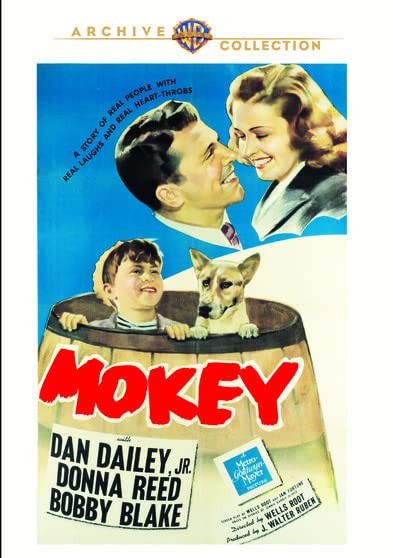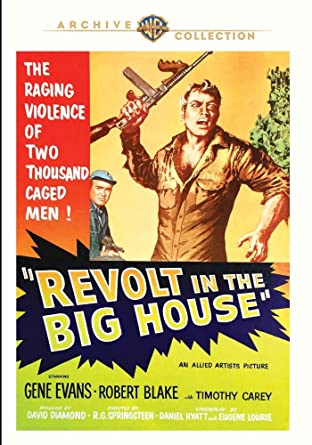
While Robert Blake is unlikely to be on everyone’s list of people to meet, the one-time child actor was one of the few of his kind to actually make a successful transition from being a kiddie icon to an adult star. And, while the spotlights for both his professional and private lives have certainly faded out, Blake – one of the few still living actors to have starred in the original Our Gang / Little Rascals short subjects – has nevertheless left a lengthy legacy behind. Starting out as a young doe-eyed Bobby Blake (as he was then known as, for the full “Robert” was apparently only reserved for adults), Blake found himself receiving the royal star treatment in a feature-length film as the immortal Hal Roach/MGM shorts neared an end.
The film, 1942’s Mokey, was an adaptation of a short story character from Good Housekeeping magazine, and enabled the child actor to try out that whole drama thing. Mokey finds Blake as the titular character, an eight-year-old boy in the South who sees very little of his father (traveling businessman Dan Dailey, Jr., who receives top-billing even though he’s hardly in the film), and whose mother has passed away. When he’s not annoying the hired housekeeper/cook/childcarer (Etta McDaniel) with his impish antics, Mokey is off getting into another kind of mischief. When his father brings home a new, beautiful bride (Donna Reed), Mokey dreams his new mother will pick up where the dead one left off. Instead, his bad behavior from always being neglected lands him into more hot water, and only stunts the growth of their relationship.
It isn’t long until Mokey is running away, with a generous portion of the movie devoted to Mokey and his (poor) black friends who live down by the swamp covering Mokey’s face with soot so that he can pass as their cousin. (I’d love to see somebody try that in motion pictures today!) Said children are played by Blake’s regular Our Gang co-star Billie “Buckwheat” Thomas (in what was not only his first non-Our Gang role, but his final film performance to boot), Marcella Moreland (yes, Mantan’s daughter), and a young lad named Cordell Hickman – whose character is called Booker T (whom we can only assume later founded a funk band).
A poor abused doggy become Mokey’s friend and grand theft auto companion later in the film (which would have made for a substantially more intriguing storyline) and George Lloyd is local cop who is always given the unenviable task of tracking the l’il hoodlum down in this lukewarm family-friendly drama that goes out of its way to encourage audiences to buy war bonds come the end credits. The Warner Archive presents this obscurity with Robert Blake on DVD-R in a very nice-looking transfer. The title receives a 1.37:1 transfer here, with the original theatrical trailer (wherein co-star Lloyd introduces Blake to the audience) accompanying.

Sixteen years later, Blake found himself on the wrong side of the law once again, this time cast in a supporting role as a Hispanic inmate in the 1958 Allied Artists production of Revolt in the Big House. Though its production values are much lower than that of the previously-mentioned MGM wartime feature, and the very inception of the picture was obviously inspired by the success of Riot in Cell Block 11 – so much so that they actually built their story around stock footage from that film – Revolt in the Big House is an arguably more entertaining title, just for its hilariously abrupt “Well, we told our story, so just end the damn thing!” finale if nothing else.
Here, Gene Evans stars as one of noir film’s most hard-boiled bad guys. So much so, that Evans phones it in from Frame One (much like I’m doing with this article), leaving virtually all of the acting bits to his younger former child actor co-star (and who succeeds admirably). The story begins with big time racketeer Lou Gannon (Evans) being gunned down by police when they attempt to nab him. A couple of idle policemen who apparently have nothing else better to do then talk about Gannon, wherein the flashback tale of how Gannon went from being untouchable to doing a brief stint in stir. Of course, prison life doesn’t suit the gangster, and he’s off plotting an escape plan in no time with the help of several other tough-as-nails dudes.
Filling in the gaps of the fellow escape artists are character actors John Qualen (who is truly excellent here in another phoned-in performance that borders on being sublime), Sam Edwards, John Dennis, Frank Richards, and the one and only Timothy Carey. And I only mention Mr. Carey last because I want to talk about his some more. If there is any reason to see Revolt in the Big House at all (and there is, if you’re a B movie aficionado), it’s to see Timothy Carey in one of his many commandingly psychopathic performances. Whether he’s just sitting there babbling as if he were drunk, stoned, or both, or outright chewing up the scenery around his co-stars, Carey and his larger-than-life periorbital dark circles definitely stand out here.
There is little doubt that Revolt in the Big House was a very rushed, extremely minor affair. Not only was the entire piece written around stock footage from Riot in Cell Block 11, but it even brought in Emile Meyer to play the warden once again; a character that doesn’t really appear until more than halfway through the feature, with big Walter Barnes as a contemptible guard captain representing the law for the most part. Frank Ferguson, X Brands, and Tom Kennedy are just some of the many familiar faces who also appear in bit parts throughout the film, with former Playboy Playmate Arline Hunter cast as the film’s only female in the flick – who, as it turns out, is just a passing drink of water on the staircase Evans’ character gets shot by the coppers.
The only one of three joint collaborations by writers Daniel James (also known as Daniel Hyatt during his blacklisted days thanks to Senator McCarthy and his malarky) and Eugène Lourié that didn’t focus on giant monsters (as the pair also worked on The Beast from 20,000 Fathoms and The Giant Behemoth), Revolt in the Big House was directed by B western/crime drama helmsman R.G. Springsteen. At its worst, it’s a forgettable low-budget prison movie with corny dialogue and a cast and crew who were obviously grabbing a quick paycheck. At its best, it’s an enjoyable bad rehashing of another movie that features some standout (B) performances from Blake, Carey, and Qualen.
Of course, I recommended it for that if nothing else. The Warner Archive Collection DVD-R presents the black-and-white class-ick in its original matted widescreen presentation with mono audio in accompaniment. Sadly, there is no trailer to be found for this one here. A third Robert Blake movie, the 1972 pre-Baretta redneck racin’ flick, Corky, where our fallen star is an unlikable stock car driver with a chip on his shoulder (read: stock car driver), has also found its way to Manufactured on Demand DVD from the Warner Archive, and is also presented in its original widescreen (2.35:1) aspect ratio so you can see all of those cameos by popular NASCAR drivers of the time (God help us). All three titles make their home video debut here.